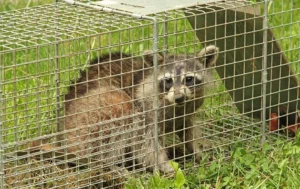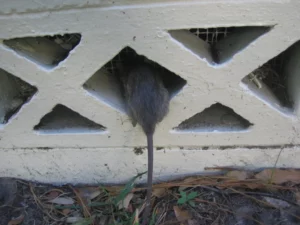
Welcome to Critter Stop comprehensive guide on animal control and prevention. In this article, we will address the top warranty questions regarding critter control and provide you with effective strategies for dealing with animal infestations, preventing animal intrusions in your home, and protecting your property from wildlife damage. Let's dive right in!
When it comes to animal control, it's essential to prioritize the safety of both humans and animals. Unwanted critters can cause damage to property, spread diseases, and pose a threat to the well-being of individuals. In this article, we will explore effective strategies for safely removing unwanted critters from your property and learn about natural methods for keeping animals away from your home.

Removing unwanted critters can be challenging, but there are humane and effective methods to consider. The first step is to identify the problem areas and understand the habits of the animals you want to remove. Are they attracted to food sources? Do they seek shelter in specific areas of your property?
Once you have a clear understanding of the critters' behavior, you can choose the most appropriate removal method. Live traps are a popular choice as they allow you to capture the animal without causing harm. It's important to follow the guidelines provided with the trap to ensure the safety of both the animal and yourself.
Another option is to use repellents that deter the critters from entering your property. There are various types of repellents available, including natural ones that are safe for both animals and the environment. These repellents work by emitting scents that animals find unpleasant, discouraging them from coming near your home.
Exclusion techniques are also effective in preventing critters from entering your property. This involves sealing off any entry points that the animals may be using, such as gaps in fences or cracks in the foundation. By blocking their access, you can significantly reduce the chances of them returning.
Prevention is key when it comes to animal control. By making your property less appealing to critters, you can discourage them from setting up camp. One natural method is to use specific plants that animals find unappealing. For example, marigolds and lavender are known to repel certain insects and small mammals.

Additionally, certain scents can deter animals from approaching your home. Peppermint oil, for instance, is disliked by rodents and can be used as a natural repellent. By strategically placing cotton balls soaked in peppermint oil around your property, you can create a barrier that animals are reluctant to cross.
Maintaining a clean and well-maintained property is another effective way to reduce the likelihood of attracting unwanted visitors. Regularly remove any potential food sources, such as fallen fruits or unsecured trash cans. Keep your yard tidy and free from clutter, as this can discourage critters from seeking shelter.
Remember, animal control should always be approached with compassion and respect for the creatures involved. If you are unsure about the best course of action or dealing with a potentially dangerous animal, it's advisable to seek assistance from professional animal control services.
If you're dealing with a persistent animal infestation problem, it may be necessary to work with professionals who specialize in critter control.
Animal infestations can be a major nuisance, causing damage to property and posing health risks. Whether it's a raccoon rummaging through your trash cans, bats nesting in your attic, or mice scurrying around your kitchen, these unwanted guests can wreak havoc on your peace of mind. That's why finding long-term solutions is crucial to effectively address the issue.
When it comes to dealing with animal infestations, it's important to recognize the expertise and experience that professional animal control specialists bring to the table. These professionals have dedicated their careers to understanding the behavior and habits of various animals, allowing them to develop effective strategies for removal and prevention.
Professional animal control specialists have the knowledge and experience to effectively address animal infestations. They can assess the severity of the problem, develop a tailored plan, and implement solutions that prioritize the safety and well-being of the animals. By working with these experts, you can rest assured that the infestation will be handled with utmost care and professionalism.
One of the key advantages of working with professionals is their ability to conduct a thorough assessment of the infestation. They will identify the species involved, determine the extent of the problem, and locate any entry points or nesting areas. This comprehensive approach ensures that no stone is left unturned, increasing the chances of a successful resolution.
Once the assessment is complete, the professionals will develop a customized plan that suits your specific situation. This may involve trapping and removing the animals, sealing off entry points to prevent future infestations, or implementing deterrent measures to discourage their return. The plan will be tailored to address the unique challenges posed by your particular infestation, ensuring the most effective and efficient outcome.
Moreover, professionals prioritize the safety and well-being of the animals involved. They understand the importance of humane animal control practices and will take steps to minimize harm. This includes utilizing traps and removal methods that avoid causing unnecessary pain or distress. By adopting a humane approach, we can safeguard both animals and the environment.
Humane animal control practices prioritize the welfare of animals, focusing on solutions that minimize harm. This approach recognizes that animals are sentient beings capable of experiencing pain and suffering. By treating them with respect and compassion, we can achieve a balance between human needs and animal welfare.
When it comes to animal infestations, humane control methods offer several benefits. Firstly, they ensure that animals are not subjected to unnecessary suffering. Traps and removal techniques are designed to capture animals safely and without causing harm. This reduces stress and trauma for the animals, allowing them to be released back into their natural habitats whenever possible.
Secondly, humane animal control practices are environmentally friendly. By avoiding the use of harmful chemicals or indiscriminate killing methods, we can protect the delicate balance of ecosystems. This is particularly important when dealing with wildlife infestations, as many species play vital roles in maintaining the health and biodiversity of our natural surroundings.
Lastly, adopting a humane approach to animal control promotes a sense of ethical responsibility. It encourages us to consider the impact of our actions on the lives of other creatures and to find solutions that respect their intrinsic value. By prioritizing the welfare of animals, we can foster a more compassionate and harmonious coexistence with the natural world.
In conclusion, when faced with a persistent animal infestation problem, seeking the assistance of professional animal control specialists is essential. Their expertise, experience, and commitment to humane practices ensure that the infestation is effectively addressed while prioritizing the well-being of both humans and animals. By embracing a humane approach to animal control, we can find long-term solutions that not only solve the immediate problem but also contribute to a more compassionate and sustainable future.
Preventing animal intrusions is crucial to maintain the safety and cleanliness of your home. Here, we will discuss simple steps to animal-proof your property and creating a barrier to keep animals out of your garden.
Animal-proofing your property involves identifying potential access points and making necessary modifications to deter animals. This may include sealing cracks, securing openings, and implementing barriers. Additionally, properly storing food and garbage can significantly reduce the likelihood of attracting wildlife to your home.

If your garden is a frequent target for animal intrusions, creating a barrier can be an effective solution. This can be achieved by using fencing, netting, or other physical barriers to prevent animals from accessing your plants. Additionally, strategic planting of certain flowers or herbs can help repel pests naturally.
Squirrel infestations, raccoon encounters, and skunk encounters are common animal nuisances that homeowners face. Here, we will provide tips for managing each of these scenarios safely and effectively.
Squirrels can be persistent attic invaders, causing damage and creating potential fire hazards. To manage squirrel infestations, it's important to identify their entry points, seal them off, and then use appropriate traps or deterrents. Once the squirrels are safely removed from your attic, ensure that all potential access points are sealed to prevent future infestations.
Raccoons can be resourceful and can cause damage to your property and garden. To remove raccoons, consider using live traps or seeking assistance from a professional raccoon removal service. After removal, taking preventive measures such as securing trash cans and eliminating food sources can help deter future raccoon intrusions.
Skunks can be problematic due to their distinct odor and potential for spraying when threatened. If you encounter a skunk, it's crucial to keep a safe distance and avoid startling the animal. Professional assistance should be sought for skunk removal, as they require specialized handling to prevent being sprayed. Implementing exclusion measures, such as sealing entry points, can reduce the likelihood of skunks taking up residence near your home.
Wildlife can cause significant damage to your garden, especially deer and rabbits. Furthermore, birds may nest in unwanted areas, creating additional issues. In this section, we will discuss preventive measures to keep your property safe from wildlife damage.
Deer and rabbits can wreak havoc on gardens, causing significant plant damage. To safeguard your garden, consider installing fencing around the perimeter to deter these animals. Additionally, planting deer and rabbit-resistant plants can help mitigate the risk of damage.
Birds nesting in unwanted areas can cause issues such as blocked vents and potential structural damage. To keep birds from nesting in unwanted areas, install deterrents like bird spikes or netting. It's important to ensure that these deterrents are installed correctly and do not cause harm to the birds.
By following the strategies and tips outlined in this comprehensive guide, you'll be well-equipped to handle animal control and prevention effectively. Remember to prioritize safety and humane practices when addressing critter infestations, and consider seeking professional assistance for persistent problems. Protecting your property from wildlife damage requires diligence and proactive measures, but with the proper approach, you can ensure a critter-free and harmonious living environment.